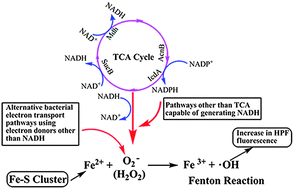OH radical production stimulated by (RW)4D, a synthetic antimicrobial agent and indolicidin†
Abstract
Antimicrobial

* Corresponding authors
a
Department of Chemistry, New York University, 100 Washington Square East, New York, NY 10003, USA
E-mail:
nrk1@nyu.edu
Fax: +1 212-260-7905
Tel: +1 212-998-8757
b
School of Chemistry and Chemical Engineering, Huazhong University of Science and, Technology, 1037 Luoyu Road, Wuhan 430074, China
E-mail:
zs_shi@mail.hust.edu.cn
Fax: +86 27-8754-3632
Tel: +86 27-8779-3907
Antimicrobial

 Please wait while we load your content...
Something went wrong. Try again?
Please wait while we load your content...
Something went wrong. Try again?
Z. Liu, Y. Cai, A. W. Young, F. Totsingan, N. Jiwrajka, Z. Shi and N. R. Kallenbach, Med. Chem. Commun., 2012, 3, 1548 DOI: 10.1039/C2MD20272G
To request permission to reproduce material from this article, please go to the Copyright Clearance Center request page.
If you are an author contributing to an RSC publication, you do not need to request permission provided correct acknowledgement is given.
If you are the author of this article, you do not need to request permission to reproduce figures and diagrams provided correct acknowledgement is given. If you want to reproduce the whole article in a third-party publication (excluding your thesis/dissertation for which permission is not required) please go to the Copyright Clearance Center request page.
Read more about how to correctly acknowledge RSC content.
 Fetching data from CrossRef.
Fetching data from CrossRef.
This may take some time to load.
Loading related content
